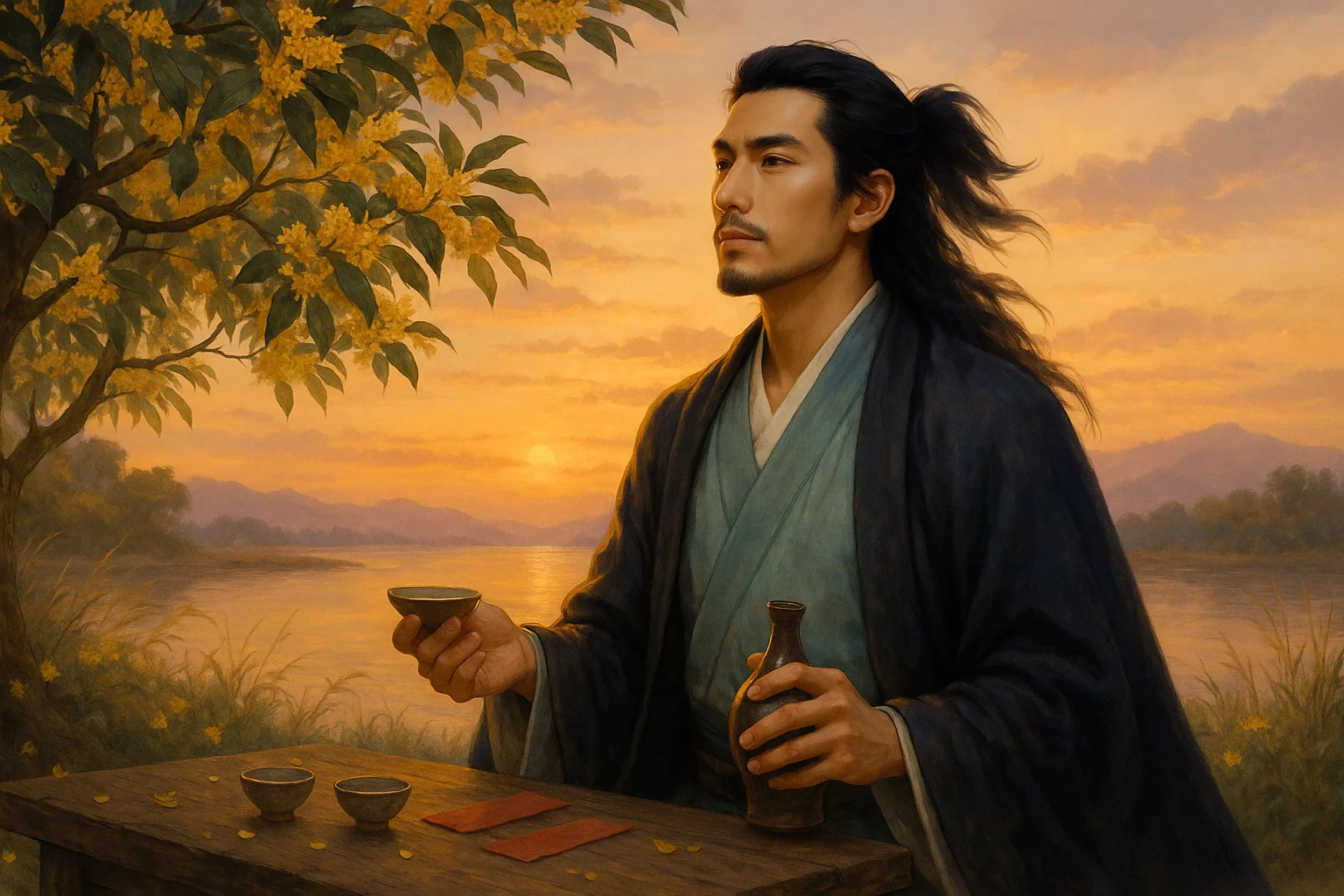All day cart-wheels grind through yellow mud,
I dread the pheasant's cry from barren mulberries.
Wind and rain know not if spring's come or gone—
Willows trail their green tresses low over half the river.
Original Poem
「弋阳渡头」
刘过
车声尽日滑黄泥,怕听空桑叫竹鸡。
风雨不知春早晚,柳条拖绿半江低。
Interpretation
This poem depicts scenes at the ferry of Yiyang County in Jiangxi. Traveling through spring's subtle transformations, the poet captures nature's delicate shifts and life's minute details, expressing both anticipation for spring and lament over time's passage. The work exemplifies Song dynasty poets' keen observation and rich inner worlds, reflecting their sensitivity to life and nature amid turbulent social currents.
First Couplet: "车声尽日滑黄泥,怕听空桑叫竹鸡。"
Chē shēng jìn rì huá huáng ní, pà tīng kōng sāng jiào zhú jī.
All day, cartwheels slide through yellow mud—
I dread the cry of pheasants
in barren mulberry trees.
The couplet juxtaposes kinetic clamor against acoustic solitude. "Sliding cartwheels" (滑黄泥) viscerally conveys rain-sodden travel, while "dreaded pheasant cries" (怕听竹鸡) transform birdsong—typically a spring herald—into an omen of loneliness. The sensory contrast mirrors the poet's fractured psyche: external bustle versus internal desolation.
Second Couplet: "风雨不知春早晚,柳条拖绿半江低。"
Fēng yǔ bù zhī chūn zǎo wǎn, liǔ tiáo tuō lǜ bàn jiāng dī.
Wind and rain, ignorant
of spring's dawn or dusk—
willow trails drape emerald
low over half the river.
Here, meteorological indifference ("ignorant winds") contrasts with botanical certainty ("emerald trails"). The willows' "draping low" (拖绿低) performs vegetative humility—bowing yet persistent, embodying resilience beneath spring's capricious veil. The river becomes a canvas where nature's tenacity defies climatic ambiguity.
Holistic Appreciation
In four compact lines, the poem constructs a humid, liminal springscape. The opening's tactile sludge ("sliding cartwheels") and jarring birdsong establish sensory dissonance, while the couplet's climatic confusion and arboreal resolution trace an emotional arc from irritation to tempered hope.
The poet navigates duality: between journey's friction and nature's quiet endurance, between seasonal disorientation ("ignorant winds") and vegetative certainty ("emerald trails"). This oscillation mirrors Song intellectuals' existential navigation—anchoring fleeting human anxieties in nature's cyclical assurances.
Artistic Merits
- Kinetic-sonic counterpoint
The "sliding wheels" and "dreaded cries" create dissonant rhythms that mirror psychological unrest. - Meteorological irony
"Ignorant winds" personify nature's indifference while highlighting spring's elusive essence. - Botanical semaphore
Willows "draping low" become living hieroglyphs of resilience—bent but unbroken. - Chromatographic depth
"Yellow mud" versus "emerald trails" maps emotional desaturation to reemerging vitality.
Insights
The poem teaches attentiveness to liminal moments—when spring hesitates between downpour and blossom. Its "dreaded birdsong" reminds us that nature's beauty often arrives uncomfortably, demanding we recalibrate our senses to receive it. The willows' river-draping posture offers a model: to bend without breaking, finding grace in suspension between storm and sun.
For modern readers, this work resonates as an antidote to productivity culture—the carts' futile "sliding" mirrors our spinning wheels, while the willows' quiet greening suggests alternate rhythms of growth. Ultimately, it proposes that hope isn't loud proclamation but silent persistence: a trail of green emerging from yellow mud.
About the Poet

Liu Guo (刘过 1154 - 1206), a native of Taihe in Jiangxi, was a ci poet of the Bold and Unconstrained School (haofang pai) during the Southern Song Dynasty. Though he remained a commoner all his life, wandering the rivers and lakes, he associated with literary giants like Lu You and Xin Qiji. His ci poetry is impassioned and heroic, and his verse is vigorous and forceful. Stylistically close to Xin Qiji but even more unrestrained, Liu Guo became a central figure among Xin’s poetic followers.












